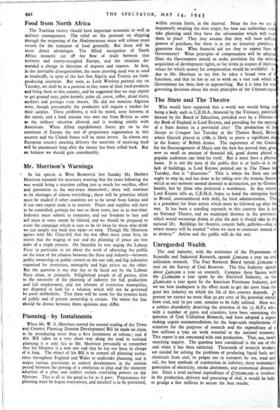The State and The Theatre
Who would have supposed that a world war would bring int being a body such as C.E.M.A., financed by the Treasury, paternall blessed by the Board of Education, presided over by a Director the Bank of England in Lord Keynes, and providing for the openin: of a State theatre in a provincial city? The production of Sh Stoops to Conquer last Tuesday at the Theatre Royal, Bristo where Garrick played in r766, is likely to prove a significant dal in the history Of BrtriSh drama. The experience of the Coun for the Encouragement of Music and the Arts has proved that, give ever so small an amount of financial aid, good drama played ti popular audiences can fend for itself. But it must have a physi home. It is not the taste of the public that is at fault—it is th lack of buildings, as Lord Keynes pointed out in The Times las' Tuesday, that is " disastrous." That is where the State can an ought to step in, and has done so by taking over the historic theatre which at one moment seemed doomed to destruction, not by German bombs, but by those who preferred a warehouse. In due season, Lord Keynes tells us, C.E.M.A. hopes to hand the enterprise back to Bristol, unencumbered with debt, for local administration. This is a precedent for State action which must be followed up after the war. It has been a standing reproach to this country that it has no National Theatre, and no municipal theatres in the provinces, which would encourage drama to play the part it should take in the national life. Buildings for theatres, concert halls, galleries—that is where money will be wanted " when we turn to construct instead of to destroy." Artists and the public will do the rest.


























 Previous page
Previous page